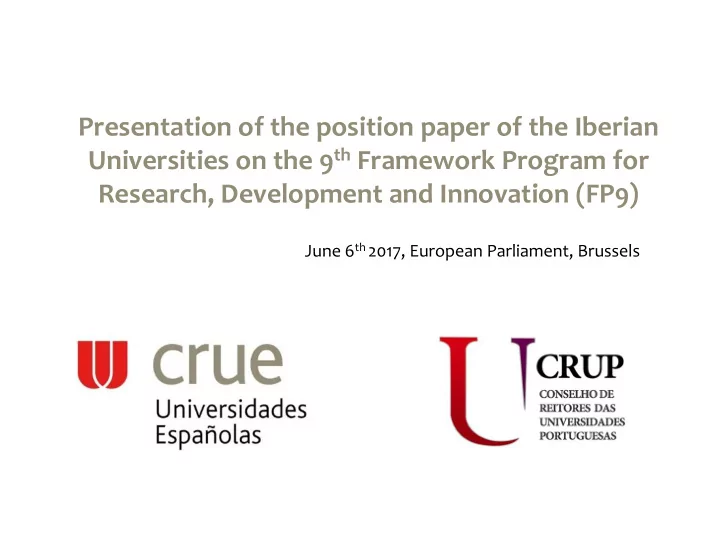

Presentation of the position paper of the Iberian Universities on the 9 th Framework Program for Research, Development and Innovation (FP9) June 6 th 2017, European Parliament, Brussels
Research landscape in Spain & Portugal Spain and Portugal are currently facing several problems concerning R&D. The main issues both countries are experiencing are the following: 1. Insufficient funding and investment for R&D. (In last years some improvements in Portugal are appreciated) 2. Human Resources concerns: • Brain drain • Lack of scientific career development perspectives 3. Weak sinergies between European research funding and structural funds (European Regional Development Fund and European Social Fund). The RIS3 Experience was highly frustrating, except in some particular regions as Nord Portugal, Galicia, Basque Country …
Opening questions Robert – Jan Smits, Octavi Quintana among others 1. Continuity vs. Break 2. Excellence vs. Cohesion 3. Top-down vs. Bottom-up 4. Cost-based vs. Output-Based 5. Grants vs. Loans 6. International vs. European 7. Collaborative vs. Single beneficiaries 8. All stakeholders eligible vs. Smaller industries
Highlights of the FP9 position paper 1. An increased budget sufficient to face the future challenges of European research, development and innovation. We, the Academy, and Europe in general must be convinced about the value of research and innovation for the social and economic progress of our countries, and then this must be considered in the budget. 2. The Excellence Science Pillar should be reinforced but reaching a wider number of projects so that no excellent proposal is left out due to lack of funding. The very low level of acceptance is a source of frustration specially for young researches. 3. A specific pillar for Social Sciences, due to the EU pressing problems (immigration, refugees, national identity, values, citizens, security, etc.). The European social and cultural roots need to be reinforced. The investigation in the new social and economic challenges of Europe merits deep consideration. 4. Synergies of H2020 and Structural Funds have proved to be less operational than expected . (The Ris 3 experience must be used to improve this synergy)
Highlights of the FP9 position paper 5. Iberian universities strongly support the open science and open access movements. (Open innovation must be analysed) 6. Pillars 2 and 3 are too focused on higher Technology Readiness Levels (TRLs), limiting the future absorption of disruptive innovations that are still in the pipeline of research projects with lower TRL. It is necessary to consider all the steps from the idea to the market. 7. New PPP-JTI should be shaped in order to tackle topics that are crucial for Europe. Large industries have taken over this initiative jeopardizing the incorporation of SMEs and some time the Universities .
Highlights of the FP9 position paper 8. Simplification: Clear rules about the eligibility of internally invoiced costs are needed. Clearer and easier guidelines about legal and financial aspects. More friendly participant portal for newcomers. 9. Clear evaluation criteria for the impact section: This part is evaluated too bureaucratically leading to incorrect results. Exploitation and market orientation is areal challenge for pillars 2(Industrial leadership) and 3 (Societal Challenges). It is necessary a regulation about the meaning of impact. 10. Open to the world: Cooperation with third countries. Spain and Portugal are open specially to Latin-America and Africa . Ambitious initiatives as PRIMA for the Mediterranean countries or “skill and competences” are welcomed by our communities 11. Large/Small Projects: Reconsider the size of consortia. Avoid projects with excessive management costs
Closing questions 1. Continuity vs. Break 2. Excellence vs. Cohesion 3. Top-down vs. Bottom-up 4. Cost-based vs. Output-Based 5. Grants vs. Loans 6. Internationa l vs. European 7. Collaborative vs. Single beneficiaries 8. All stakeholders eligible vs. Smaller industries
We need more Europe, more ideas, more clever and young people, more research and innovation, and more money (of course). Muito Obrigado. Muchas Gracias
Recommend
More recommend